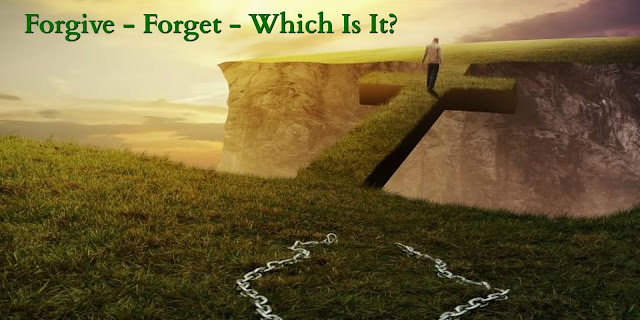It's so important that we know the accurate meaning of words used in Scripture.
For example, "forget" (not remember).
Although the Bible normally uses the word "forgive," several verses say that after God forgives us, He no longer remembers our sins (e.g. Isaiah 43:25; Hebrews 8:12).
This means God no longer holds our sins against us. At the final judgment, no sin will keep us from eternal life because our salvation is based on Christ’s righteousness, not our own (Romans 6:23).
This is a figurative use of the word in much the same way we use it at times. For example, when a friend borrows money for lunch and says, "I owe you for lunch." We might say, "Forget it." We're telling him we'll pay for it. We're not telling him not to remember it.
How do we know that it's figurative when God says He "forgets" our sins? Because:
1. He’s still all-knowing, past, present, and future (Hebrews 4:12-13).(1)
2. He examines hearts and understands how our past sins impact our present problems (Jeremiah 17:10).(2)
3. Some sins have consequences even when they are forgiven, and God is fully aware of those consequences. He uses them to train us (Hebrews 12:3-11; Romans 8:28).(3)
4. We are fully forgiven, but we're told that God addresses our sins at the final judgment (2 Cor. 5:9-10).(4)
5. He's aware of repetitive sins we commit and helps us overcome them (Philippians 2:12-13).(5)
----------------------------
(1) See Forgive and Forget
(2) See The Only God Who Wants to Be our Father
(3) See God Punishes and Discipline, Punishment, Condemnation
(4) See Final Judgment
(5) We want God to know our history so He can help us recognize underlying problems and patterns of sin, weaknesses and addictive behavior. See Doing Our Part
If you have questions about this devotion or would like to do a little more in-depth study of this subject, check out today's Bite Size Bible Study.
2. He examines hearts and understands how our past sins impact our present problems (Jeremiah 17:10).(2)
3. Some sins have consequences even when they are forgiven, and God is fully aware of those consequences. He uses them to train us (Hebrews 12:3-11; Romans 8:28).(3)
4. We are fully forgiven, but we're told that God addresses our sins at the final judgment (2 Cor. 5:9-10).(4)
5. He's aware of repetitive sins we commit and helps us overcome them (Philippians 2:12-13).(5)
----------------------------
(1) See Forgive and Forget
(2) See The Only God Who Wants to Be our Father
(3) See God Punishes and Discipline, Punishment, Condemnation
(4) See Final Judgment
(5) We want God to know our history so He can help us recognize underlying problems and patterns of sin, weaknesses and addictive behavior. See Doing Our Part
If you have questions about this devotion or would like to do a little more in-depth study of this subject, check out today's Bite Size Bible Study.
I encourage you to check out the Wisdom for Life Devotional. It contains 100 one-minute devotions to challenge, encourage, instruct, and inspire your love for God's Word. Read the story behind Wisdom for Life HERE. And find out about the two free Bible studies with purchase HERE. You can read the first 4 devotions in the book by clicking "look inside" or "read sample" on Lifeway or Amazon.
I also encourage you to sign up for a free subscription to Bible Love Notes and get a free e-booklet. Find out more HERE.





So Jesus' atonement is not enough...we pay too?
ReplyDeleteHi Angela,
DeleteI think you will find that these lines lifted directly from the devotion answer your question:
"God no longer holds our sins against us. At the final judgment, God gives us eternal life on the basis of Christ’s righteousness, not according to what our sins deserve (Romans 6:23)...God retains a memory/knowledge of our sins after He's erased them from our 'accounts payable.'"
Every point in this study is linked to a Scripture that confirms the point. I encourage you to go back and read each linked passage.
Regarding the second half of your question about whether we pay for sins, that depends on what you mean. I've explained that God "forgets" our sins legally.
We can't pay legally for a single sin. Only Christ could do that.
But repentance doesn't erase earthly consequences for our sins, so we do pay for our sins in earthly consequences.
The main point of this devotion is that God doesn't have amnesia when it comes to our sins. He "forgets" them in a legal way, but is still an all-knowing God who can help us deal with sin patterns with full knowledge of our past, present and even our future.
I'm grateful for God's omniscient help with my sins.
How then will He call us to account? I find this part very confusing.
ReplyDeleteHi Connie,
DeleteI'm not sure that I fully understand your question, but let me give it a try.
When we genuinely give our lives to the Lord, we are saved, forgiven, sealed in the Holy Spirit, and no longer under condemnation because Christ paid for our sins.
But while we are on earth, we continue to work out our sanctification - we are in the process of putting off our old sin nature and putting on our new Christ-like nature.
During that process, God "calls us to account" for our sins. He disciplines us and rebukes us and encourages us and teaches us. This is very important because the more we yield to His work in our hearts, the stronger Christian we become. But our earthly sanctification does not save us. It is proof of our salvation.
There are two schools of thought within Christianity. The Calvinist believes that anyone who is genuinely saved will never walk away from the Lord. The non-Calvinist believes that a person can walk away from the Lord after being saved. But both schools of thought agree that a genuinely saved person will behave like they are saved, taking their sanctification seriously, repenting of their sins and seeking to draw closer to the Lord.
So how does God call us to account?
He calls non-saved people to make Him their Lord.
He calls saved people to obey His commands.
When we face the final judgement, saved people will enter heaven based on Christ's righteousness. Unsaved people will be sent to hell.
If a person does not follow the teachings of Christ, they can claim they are a Christian, but they are not.
I hope that answers your question.
I believe what she is talking about is the Beama Seat judgement....when we stand before Him and give account for ourselves.
Delete